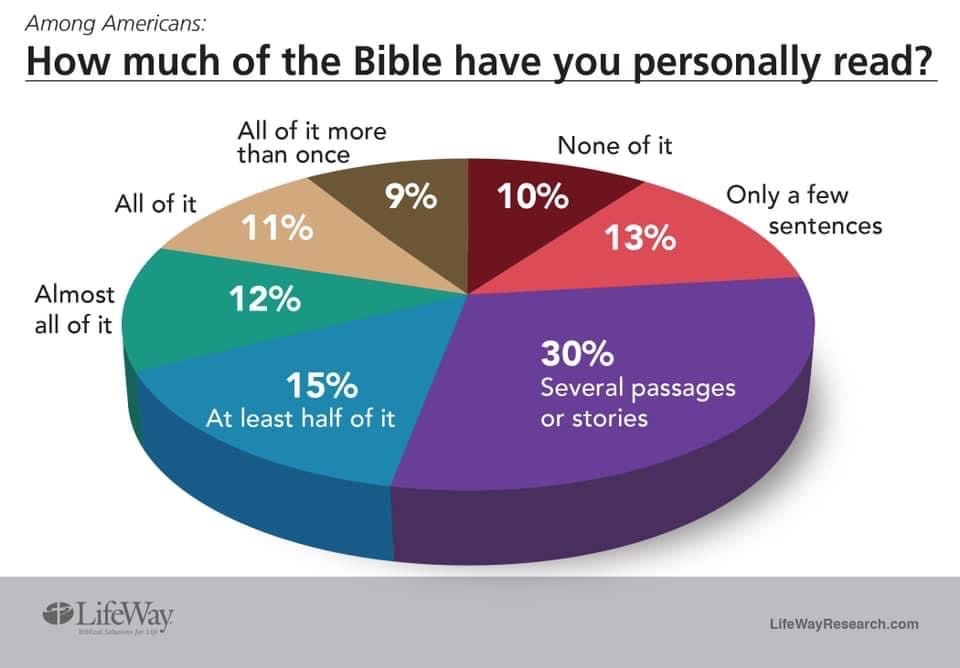I was recently approached by a friend that asked this question;
“Is it good to read other books in addition to the Bible? Or should Christians just read the Bible?”
I understand where this question is coming from. This was an excellent question, for I am a book worm and a lover of books. I love to read and love the theological books. I have had people who even said at one point, “Just read the Bible. That’s all you need.”
Here are a few thoughts as we dialogue with this important topic.
Why Is This Even a Dilemma? What is at Stake?
Why does this matter? For the doctrine of Scripture is the foundation for Christian doctrine.
God created the world by his Word (Gen 1:3; Ps 33:6). God recreates us by His Word (2 Cor 4:5-6). God calls believers to himself by His Word (Gen 12:3; Rom 8:30). God’s Word causes us to be born again (1 Pet 1:23). God’s Word sanctifies us (John 17:17). God’s Word is at work in believers to bring us to glorify God in our lives more and more (1 Thess 2:13). Therefore, God works through His Word alone!
Scripture is fully inspired. Each book in the Bible was written by men, who were inspired by the Holy Spirit to write down the words of God. Therefore, the whole Bible is the Word of God, and the Holy Spirit authenticates its authenticity and authority, as well as its power. God allows us Himself through the authority of Scripture.
The Bible is written in such a way that all believers can understand its truth through God’s help (Deut 6:1-6). The Holy Spirit illuminates the Scripture and gives men the strength to choose God over sin (1 Cor. 2:1-14).
Albert Mohler, Jr., writes on biblical affirmation: “An affirmation of the divine inspiration and authority of the Bible has stood at the center of evangelical faith as long as there have been Christians known as evangelicals.” In the Christian tradition, the fundamental affirmation of the sole authority in Scripture alone places a dividing line as a distinguishing mark for being an evangelical within the twenty-first-century.
Scripture-alone (Sola Scriptura) ought to be the motto and slogan of all churches! The sufficiency of Scripture is vital not only for its power and authority (Luke 10:19) to have the assurance of faith (Heb 11:1) but is also vital in Christian ministry.
I am fully committed and supporting that banner of life. Scripture is good for all matters of life (2 Tim 3:16-17), and ought to be the daily bread that men turn to (Matt 6:11). Sadly though, in some Bible-believing community churches that affirm the Bible as inerrant and infallible has subconsciously communicated that Scripture is insufficient for everyday practical life issues. The message unintentionally communicates that “the Bible is a book to get people saved yet is unable to offer insight into the serious issues that people deal with on a day-to-day basis.”
We Need the Whole Bible to Make a Whole Christian
In twenty-first-century evangelical churches, the sufficiency of Scripture is theoretically asserted yet not theologically affirmed.
Many churches do not outright deny the doctrine of sola Scriptura, but overtly deny that Scripture alone can help in troubling times. A church may hold to the divine inspiration of Scripture and even teach the inerrancy of Scripture, yet still, deny the sufficiency of Scripture.
Again, to grow as a Christian, the Bible is sufficient for all matters of life. As Martin Luther the Reformer said it well, “One Book is enough, but a thousand books are not too many!”
The real debate within the contemporary cultural context lies at the intersection in post-modernity where the Bible has its rightful place in authority, certainty, and the finality.
Specific Books Strengthens Doctrinal Studies in the Contemporary Culture
The benefit of reading is learning other specific areas of life. Charles Spurgeon the Prince of Preacher recommended for us to, “Visit many good books, but live in the Bible.”
Today, the phrase famously coined by the age of enlightenment period, “Lordly reasoning is empirical” has dominated western philosophy and infiltrated post-modern Christian churches.
There is a specific focus on areas of studies such as the doctrine of soteriology (the study of Salvation) with systematic theology that helps people focus on understanding the deeper way of Who God is and His wondrous deeds. These areas are helpful to understand how to defend the faith (apologetics) and Christian maturation (discipleship) that people may miss if they are simply reading just the bible (biblical theology).
Church History/Historical theology is also critical for believers. Those who do not learn history or remember are destined to repeat the past. Looking back at the early church, such as the ecumenical councils (325 – 1545 AD), there’s much to be learned. For instance, as the Roman Catholics did at the Council of Trent (nineteenth-century ecumenical council in 1545), the core doctrinal importance of the sufficiency of Scripture has been forsaken and the Bible has been abandoned.
Therefore, learning biographies of men/women of God as, “a cloud of witness” (Heb 12:1-2), is a gift unto the churches so that Christians are not doomed to repeating the same mistake of the past.
The Biblical Timeless Truth in an Ever-Changing Culture
However, all that was mentioned above, Christians must not neglect the Bible from their daily lives.
I believe all leaders ought to read books regularly, as I believe reading is good for the soul. Too often, I find more Christians who can quote famous preachers, yet not able to quote Scripture verses. “For the word of God is living and active, sharper than any two-edged sword.” (Heb 4:12).
Like the graph shown above, among American Christians, 80% of Christians have NEVER read the entire Bible. Majority according to Lifeway Christian Resource (more than 50%) indicates have read only portion of the Bible.
Because of the illiteracy of the culture, Scripture reading is hardly recognizable or does not even have a hint in one’s life. I believe, that is a dangerous place to be and very alarming.
The Scripture never changes, yet our culture changes. For this reason, churches need pastor theologians who can biblical exegete the text well and exegete the culture well and publish books that helps the bride (church).
For instance, Christians must biblically think through the rise of LGBTQ in the present time. “Nothing is new under the sun” (Ecc 1:9) as Scripture says, yet Christians must respond biblically on pressing issues. How can Christians faithfully converse with these neighbors who live in such a lifestyle? Another example may be the rise of the Islamic faith in America. How can churches lovingly demonstrate Christlikeness and not compromising the gospel in evangelism?
This same argument can be used for sermons. “Why don’t pastors just simply read the Bible?” Many will recognize how helpful a sermon can be where modern culture and language collide, where makes communication of biblical truth challenging.
Another illustration will be for translation. “Why have so many different Bible translations?” For appropriately thinking through appropriate cultural context is crucial and helpful for a specific time/place of a generation that lives in the present reality.
As the culture continues to grow in ever increasing confusion and doubt, Christians must engage the ever-changing culture with the never-changing gospel,
Scripture as Primary-reliance and Books as Secondary-option
The sufficiency of Scripture is the culmination of the inerrancy of Scripture, the infallibility of Scripture, and the inspiration of Scripture. If Scripture lacks in any of those areas, then Scripture becomes insufficient.
Martin Luther stood before the Imperial Council Diet of Worms in 1521, saying, “Here I stand, I can do no other. God help me.” Luther held to the sufficiency of Scripture as he asserted to being bound by the Word of God.
Today, the majority of evangelicals hold to the understanding that Scripture is the Word of God (in the divine authority) and believed as inerrant (infallible); however, it is understood to be insufficient in the everyday life.
While God calls us to glorify Him in every area of life, this does not exclude Christians from reading other books in addition to the Bible that can help us grow in our walk with Him and better serve others.
Commit to reading His Word on a day-to-day basis.


morning
thanks for this wonderful explanation brother – question -why was the 7 books not added to the bible
as understand they was not inspired as the books in the bible – not sure if this is correct